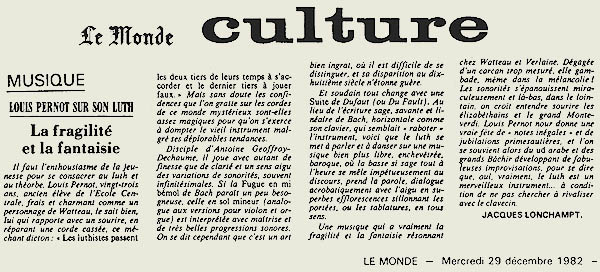Louis Pernot
Reviews and press articles
Dufaut's music is more dramatic than moving and some pieces, like "le
Tombeau de M. Blancrocher" show an unusual darkness. Faithfully and
soberly recorded, no fault can be found in Louis Pernot's
interpretation, simply because, to us, it is absolutely perfect.
Alexandre PERRIN in Diapason 1989 A propos du CD 5 suites de DUFAUT.
With fervour and passion, Louis Pernot gives life to these wonderful
divertimenti. His touch is never grandiloquent. The fact that he uses
gut strings excludes emphasis or excessive stress. The sound is pure,
sober, slightly dry. We are far from the refinements of a Hopkinson or a
Conrad Junghanel... On the other hand, the swiftness of the phrasing,
the fervour of the expression give to Pernot's interpretation an
authentic brilliance. Listen how he represents naturally the obstination
of the bass in "Tombeau de Monsieur Blancrocher", one of the master
pieces of this record. The music flows with nobleness and all along one
feels the amiable invitaton to dance.
Françis ALBOU in Répertoire Décembre 1988. A propos du CD 5 suites de DUFAUT.
Faithful to the aspect at once intimist and refined, the interpreter
moves easily and naturally through the delicate and slightly precious
phrasing of these suites. The rather moderate swiftness chosen for the
most lively dances (courantes) reveals a musician extremely eager to
highlight the subtlety of the phrasing.
Marc DESMET in Le Monde de la Musique 1989 A propos du CD 5 suites de DUFAUT.
If there is a divine rhetoric, Louis Pernot is no stranger to it.
With an instrument voluble above anything else, he rediscovers the art
of the perfect expression (purity, neatness of the melodic line,
precision of the rhythm), which is nothing but a meticulous equilibrium
between intelligence and emotion... An appealing process which will
contribute to enlarge the circle of the lovers of music for plucked
string instruments.
Xavier LACAVALERIE and Paul MEUNIER in Télérama: les 400 meilleurs disques compacts de l'année (1991) à propos du double CD La Rhétorique des Dieux de Denis Gaultier.
All the charm of Louis Pernot's interpretation comes from this subtle
equilibrium between the line and the ornament, between the expressed
and the non expressed. A charm true to what it was in the 17th century
and not some genuine preciousness. The sound is ample, generous but at
the same time feverish or plaintive (the strings of the instrument are
entirely gutted). Here and there some notes quiver or seem to vanish in
the core of the instrument... But what an impulse, what a firmness in
the rhythm of the dances! What vehemence in the phrasing! Not only does
Louis Pernot know the possibility of his instrument but he masters
beautifully the excessive power of the music. His lute does not only
sing (it does it so wonderfully!) or dance, it lives, it breathes, it
tells a story! Don't we have there the most divine rhetoric? If
Hopkinson Smith's playing may seem more sophisticated, more polished,
Louis Pernot's has no equal for "telling" in a manner more natural and
spontaneous
Francis ALBOU in Répertoire. Mars 1990 à propos du double CD La Rhétorique des Dieux de Gaultier.
Louis' review by Kemer Thomson, Music Musings, August 2005
 I
find Louis' musicianship to extraordinary. Each piece makes complete
sense. It is hard to describe just how completely he understands this
music, except to say that I have the same reaction when I hear Laurent
Stewart play Louis Couperin and Froberger. He has a simplicity and
directness that is utterly charming and compelling.
I
find Louis' musicianship to extraordinary. Each piece makes complete
sense. It is hard to describe just how completely he understands this
music, except to say that I have the same reaction when I hear Laurent
Stewart play Louis Couperin and Froberger. He has a simplicity and
directness that is utterly charming and compelling.
There are now some very good recordings of 17th century
French lute music that are more polished and better sounding, but
overall it seems that Louis Pernod's is the most heartfelt and genuine.
For years I have struggled to understand why La Rhétorique des Dieux was
important, I am convinced that this is one of the very important
collections. Truly music of the gods.
Etc etc...
Louis' first press critic, received for his second concert, was already of national scope:
"One needs the enthusiasm of youth to devote oneself to the
study of lute and theorbo. Louis Pernot, a fresh and charming
engineering student of twenty-three, knows this well. He says with a
smile, while repairing a broken string: "Lute musicians spend two-thirds
of their time tuning up and the last third playing off-key". A disciple
of Antoine Geoffroy-Dechaume, he plays with as much finesse as clarity,
and an acute sense of tone variations, often infinitely subtle. (...) The lute starts to speak and dance with a music so much more free, so baroque (...) Sonorities blossom miraculously...
Jacques Longchampt in Le Monde Culture, Dec. 1982

Home | Biography | Instrument | Researches | Recordings | Press and critics | Last recording | Teaching | Links
Contact: 
 I
find Louis' musicianship to extraordinary. Each piece makes complete
sense. It is hard to describe just how completely he understands this
music, except to say that I have the same reaction when I hear Laurent
Stewart play Louis Couperin and Froberger. He has a simplicity and
directness that is utterly charming and compelling.
I
find Louis' musicianship to extraordinary. Each piece makes complete
sense. It is hard to describe just how completely he understands this
music, except to say that I have the same reaction when I hear Laurent
Stewart play Louis Couperin and Froberger. He has a simplicity and
directness that is utterly charming and compelling. 